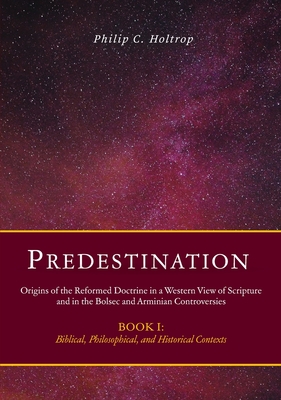Predestination: Origins of the Reformed Doctrine in a Western View of Scripture and in the Bolsec and Arminian Controversies, Biblical, Philosophical

Predestination: Origins of the Reformed Doctrine in a Western View of Scripture and in the Bolsec and Arminian Controversies, Biblical, Philosophical
Dr. Holtrop has spent a lifetime studying the Calvin vs Bolsec, Beza vs Arminius theological conflict. He has translated original theses, letters, and other documents. In this book he describes the philosophical and historical mindset under which the Reformers operated, and how that determines their conclusions.
"Calvin, Beza, and their Genevan colleagues were all Western. The acrimony in Western deliberations was very Western. The constant urge to argue was Western. The tendency to zero in on points instead of seeing them from start to finish as parts of the larger whole was Western. The stress on being in analyzing issues instead of on function-on nouns instead of verbs-was Western. The view of truth as correct doctrine instead of a more faithfulness in relations was Western."
"As an 'Eastern book, ' the Bible is most concerned about our living faithfully in this present world, with the confidence that God will bring us faithfully to the next. The very strong medieval focus on heaven and hell was largely the product of the cultural paradigm of the medieval period. The Great Age of Faith was also the Age of Fear and Trembling and Trepidation. Moreover, this was taken over in the apocalypticism of Luther's day, the literalism and individualism of the Reformation in general, and the sense of order, parallelism, and logical balance in such Renaissance figures as Calvin and especially Theodore Beza."
"We cannot divorce the Reformed orthodox view of heaven and hell, election and reprobation from its historical, philosophical, and cultural background and our own Western tendency to see things as individual, disparate, and 'either / or, ' instead of integrally and 'both / and.'"
PRP: 578.58 Lei
Acesta este Prețul Recomandat de Producător. Prețul de vânzare al produsului este afișat mai jos.
520.72Lei
520.72Lei
578.58 LeiLivrare in 2-4 saptamani
Descrierea produsului
Dr. Holtrop has spent a lifetime studying the Calvin vs Bolsec, Beza vs Arminius theological conflict. He has translated original theses, letters, and other documents. In this book he describes the philosophical and historical mindset under which the Reformers operated, and how that determines their conclusions.
"Calvin, Beza, and their Genevan colleagues were all Western. The acrimony in Western deliberations was very Western. The constant urge to argue was Western. The tendency to zero in on points instead of seeing them from start to finish as parts of the larger whole was Western. The stress on being in analyzing issues instead of on function-on nouns instead of verbs-was Western. The view of truth as correct doctrine instead of a more faithfulness in relations was Western."
"As an 'Eastern book, ' the Bible is most concerned about our living faithfully in this present world, with the confidence that God will bring us faithfully to the next. The very strong medieval focus on heaven and hell was largely the product of the cultural paradigm of the medieval period. The Great Age of Faith was also the Age of Fear and Trembling and Trepidation. Moreover, this was taken over in the apocalypticism of Luther's day, the literalism and individualism of the Reformation in general, and the sense of order, parallelism, and logical balance in such Renaissance figures as Calvin and especially Theodore Beza."
"We cannot divorce the Reformed orthodox view of heaven and hell, election and reprobation from its historical, philosophical, and cultural background and our own Western tendency to see things as individual, disparate, and 'either / or, ' instead of integrally and 'both / and.'"
Detaliile produsului










